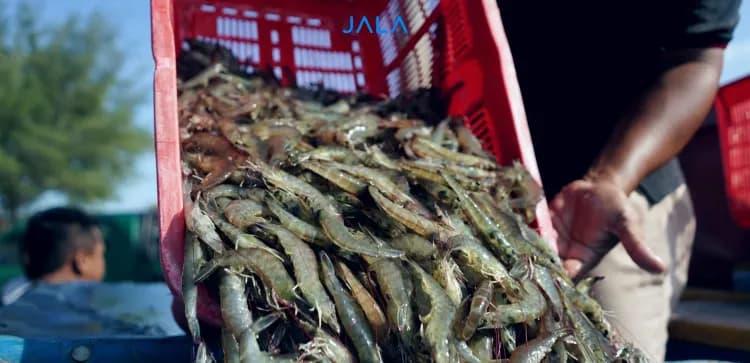
One of the factors that determine successful shrimp cultivation is the quality of the fry used. High quality fry comes from high-quality vannamei shrimp broodstock. To produce high-quality vannamei shrimp broodstock, proper care is required to ensure their health and fertility. What are the ways to care for vannamei shrimp broodstock? Find out more in this article!
How to Choose High Quality Vannamei Shrimp Broodstock
Vannamei shrimp broodstock is commonly cared for in hatcheries. First, proper selection methods are required to ensure that only high quality broodstock are chosen. The following are important criteria to consider when selecting vannamei shrimp broodstock:
1. Mature age
First, make sure that the selected vannamei shrimp broodstock has reached a mature age or 20 days after entering the adult shrimp phase.
Read more: Vannamei Shrimp Life Cycle: From Eggs to Adult Shrimp
For female broodstock, their color usually changes from white to orange once they are mature.
2. Uniform size
Next, the broodstock must have normal and uniform body sizes to ensure they can grow well. Male broodstock generally weigh between 60-80 grams and measure 18-20 cm in length. Meanwhile, female broodstock weigh more than 80 grams and measure 20-25 cm in length.
3. Complete organs
Vannamei shrimp broodstock should have complete organs, which include 5 pairs of legs, open tail, protruding eyes, and a pair of antennae.
4. Full gut
A full gut indicates that the shrimp has normal appetite. The gut can be observed as vannamei shrimp has a translucent body.
The Spawning Process in Vannamei Shrimp Broodstock
Spawning is the process of releasing eggs by the female broodstock, followed by fertilization by the sperm from the spermatophore at the female broodstock telicum. Spawning is usually initiated by feeding broodstock with fresh feed such as squid and polychaete. Gonadotrophic hormones can also be applied to speed up the maturity of shrimp gonads or sexual glands.
Male and female vannamei shrimp broodstock are placed in the spawning pond with a ratio of 1:2 to increase the probability of spawning. 4-5 hours later, eggs will be released. These eggs will develop into fry, then into adult shrimp to be cultivated.
Read more: Harvest Failure Is Not Necessarily Caused by Shrimp Fry
How to Care for Vannamei Shrimp Broodstock
Vannamei shrimp broodstock needs proper care to ensure successful spawning and hatching of eggs. Here are the steps in taking care of vannamei shrimp broodstock:
1. Preparing the container and media
The size of the container for maintaining shrimp broodstock affects the development of eggs and sperm. Generally, broodstock are kept in rectangular tanks with a length of about 8 meters, a width of 5 meters, a height of 1.5 meters, and a water depth of 1.2 meters. The containers used must be sterilized first using 200-300 ppm chlorine, then rinsed with fresh water.
Additionally, supporting facilities need to be prepared, including pipes for water inlet and outlet, aeration to increase dissolved oxygen (DO) in the water, and plastic sheets to control the intensity of light entering the container.
2. Adjusting the stocking density
The stocking density in the broodstock pond should be kept at around 1-1.5 shrimp/m². This is done to avoid cannibalism among the broodstock to maintain their health.
3. Maintaining the water quality
Water is the main living medium for shrimp, thus its quality should be well-maintained to keep the broodstock in good condition. Drastic changes in pond water quality should be avoided to prevent stress or mortality in shrimp.
The ideal water quality parameters for broodstock maintenance ponds are:
- Salinity: 32-35 ppm
- Temperature: 30-31°C
- pH: 7.5-8.5
- Alkalinity: 33-60 ppm
Water exchange is usually done twice a day, 100% in the morning and 50% in the afternoon. Leftover feed and molting shrimp shells are also cleaned every morning before feeding.
4. Controlling feeding program
Feed plays a crucial role in gonad development of vannamei shrimp for successful spawning. Some factors that can cause gonad maturation failure are feed quality, quantity, and method of feeding.
Good feed for vannamei shrimp broodstock should contain sufficient protein, cholesterol, and vitamins. These nutrients help maintain the immunity of broodstock and support gonad growth and development. The amount of feed given is 10-20% of the shrimp body weight per day.
5. Controlling pests and diseases
Another important step in vannamei shrimp broodstock maintenance is pest and disease control. Control is best done through prevention. Maintaining water quality is an important step in disease prevention because water can be a medium for diseases to spread.
Furthermore, diseases can be prevented by implementing biosecurity measures in the ponds, including sterilizing any equipment used, monitoring shrimp feed consumption levels, and ensuring the hygiene of employees or technicians working around the ponds.
Conclusion
To produce high-quality fry, vannamei shrimp broodstock must be selected and cared for properly. Selected vannamei shrimp broodstock are those that are mature (20 days after entering the adult shrimp phase), uniform in size, and have complete body parts and full guts.
Caring for vannamei shrimp broodstock requires the following steps:
- Preparing proper container and media
- Adjusting the stocking density to avoid cannibalism
- Maintaining water quality as the main living medium for shrimp
- Controlling feeding program and giving nutritious feed
- Controlling pests and diseases
Proper vannamei broodstock care will produce high-quality fry for successful cultivation. Throughout the cultivation process, farmers also need to record and monitor their cultivation to always understand their pond's performance, and take necessary steps based on actual conditions.
To help farmers run cultivation more conveniently, JALA App is #HeretoHelp with various features that make it easier for farmers to run their cultivation. Record more than 40+ cultivation parameters and get accurate predictions to take the best steps in your farm! Haven't joined JALA App? Register now at app.jala.tech or download the mobile version on the App Store or Google Play Store!




